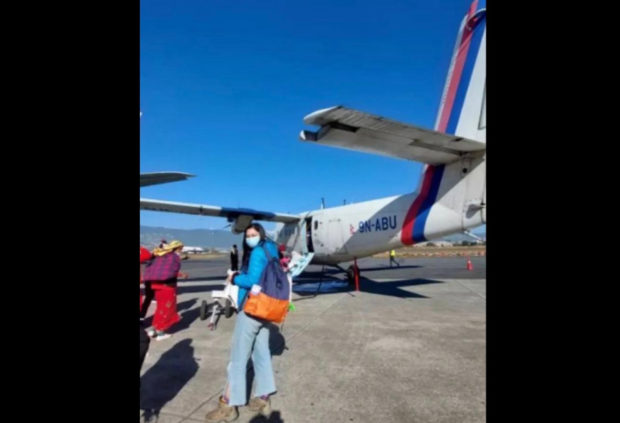
Passengers board the flight for Salle, Rukum (West) on Sunday at Kathmandu airport. Photo courtesy: Lumanti Siddhi Bajracharya via The Kathmandu Post/Asia News Network
KATHMANDU — A planeload of passengers on a Nepal Airlines flight got the surprise of their lives when they stepped out to find themselves at the wrong airport. Did the flight crew get the latitudes and longitudes mixed up? Had they been given the wrong schedule? The reason was more mundane.
The pilot of the Nepal Airlines Twin Otter headed for Salle airport put down the aircraft at Nepalgunj airport after his duty hours ended mid-flight, and he was out of time to fly to Salle and then on to Nepalgunj as per the timetable.
The story starts on a hazy Sunday morning. The 17-seater Twin Otter was scheduled to depart for Salle airport in Rukum West from Kathmandu at 6:30 am. Ten passengers had booked seats on the one-hour flight.
But fog and high winds delayed takeoff, and at 10:30 am, Nepal Airlines announced that Flight RA181 had been cancelled.
The reason was that no alternative airports were open due to the bad weather conditions, although Salle airport was open with perfect visibility and clear skies.
Alternative airports are airports that are close enough to the scheduled destination that can be used should an emergency occur. In Nepal, where the weather fluctuates by the minute and flights are operated under visual flight rules, an alternative airport is a must.
Visual flight rules are a set of regulations under which a pilot operates an aircraft in weather conditions generally clear enough to allow the pilot to see where the aircraft is going.
“So we decided to cancel the flight and informed the passengers accordingly,” Deepu Raj Jwarchan, director of the operations department at Nepal Airlines, told the Post. “All passengers then went home.”
But after 12 noon, the weather improved and almost all airports across the country opened. “We decided to resume flights to clear the backlog because, during the winter, flight cancellations are normal.”
The flight crew and passengers were asked to report to the airport. But they got there late because they were stuck in traffic, and departure was delayed.
“The flight eventually took off at 2:58 pm, late by nearly two hours as per the revised schedule,” said Jwarchan, who is also a senior captain.
As a result of the delays, the on-duty captain had only an hour left for his duty to end. And it was not possible to fly to Salle airport and then on to Nepalgunj. So the flight captain decided to fly to Nepalgunj where there was better accommodation.
“It was, anyway, a planned schedule,” said the captain.
But the passengers were not informed about the revised plan.
“We were scheduled to land in Rukum, which I thought was a hilly region,” Aayushi Bam, a passenger, told the Post over the phone from Rukum.
“We were surprised to see the flat land where we landed,” said Bam, who was on her first visit to Rukum.
“As we started to take some photographs at the airport, the airline crew came and informed us that they had arranged a hotel for us in Nepalgunj. Then we knew we were at the wrong airport.”
Bam said that they were not informed about the revision.
Nepal Airlines officials said that all passengers were put up at a hotel at the airline’s expense. They were flown to Rukum on Monday morning.
Online media were quick to pick up the story, accusing the carrier of sheer negligence.
An official at the flight safety department of the Civil Aviation Authority of Nepal, the regulator, told the Post that special permission was required if a pilot’s duty period ends. “But the pilot cannot fly if his or her flying duty period or flight duty time ends.”
Buddhi Sagar Lamichhane, joint secretary at the Tourism Ministry who looks after aviation affairs, told the Post that the ministry was not aware of the incident. “It’s not a serious issue that deserves so much attention.”
There are two sets of duties: Flying duty period and flight duty time. The flying duty period is the time set when the pilot’s presence, from office attendance to the end of office hours, is accumulated. Flight duty time begins when the pilot starts the aircraft engine and ends when it is shut down.
According to the Flight Operations Requirements of the Civil Aviation Authority of Nepal, the maximum flight duty period during a 24-hour period for pilots engaged in two pilots operation shall be 11 hours of which not more than 9 hours shall be for operation by aeroplane for non-short take-off and landing (STOL) domestic operation.
For domestic STOL operations, the maximum flight duty period in any 24-hour period for pilots engaged in two pilots operation shall be 10 hours of which not more than 8 hours shall be for operation by aeroplane.
A senior Nepal Airlines official told the Post that the decision to fly to Nepalgunj was taken for the convenience of the passengers. “In the winter, the weather is unpredictable. If the passengers reach Nepalgunj, they have the option to travel to Rukum overland if the cancellation lasts longer.”
He said that the pilot had enough time to land at Salle airport, but the airport had no engineering support, security and refuelling facilities. “A night stop in Rukum would be another problem.”
Usually, the period from mid-November to February is considered to be the worst period for airlines due to a pattern of frequent weather fluctuations. The weather may be clear in Kathmandu but bad at other airports.
RELATED STORY
Leopard shuts down Nepal airport